All Topics
- Alchemizing Music Concepts for Students
- Artist Spotlight
- Artium Maestros
- Artium News
- Carnatic Music
- Devotional Music
- Editorials by Ananth Vaidyanathan
- Film Music
- Guitar
- Indian Classical Music
- Insights
- Instruments
- Karaoke Singing
- Kids Music
- maestros
- Music Education
- Music for Kids
- Music Industry
- Music Instruments
- Music Theory
- Music Therapy
- Piano
- Time Theory
- Tools
- Uncategorized
- Vocal Singing
- Vocals
Music and Kids
Music and Kids

Table of Contents
“Music has a power of forming the character and should therefore be introduced into the education of the young.” – Aristotle
Every human being may relate to the word “music.” Music is everywhere around us; the chirping of the birds, the rumbling thunder, the rustling leaves, the whirling winds, and the rhythm of nature. Every stage of our life is connected to music in some way. A newborn child relates and responds to a lullaby before communicating. Music pacifies, soothes, motivates, and encourages a child, thereby providing them with a happy childhood. For many, music is considered a fundamental right, and it is safe to say that the younger they are exposed to music, the better they will be with the skill.
Why music is good for kids?
Former American President Clinton once said, “I don’t think I would have become President if it were not for my school music program.”
Every parent wants the best for their children and aspire their children to become emotionally stable, independent, confident, socially skillful, and happy. The best way to instill all these qualities in a child is by introducing them to music at an early age. Introducing music in any form, like singing or playing an instrument, at a young age helps the child express themselves better in cognitive development, kindling the imagination and curiosity, the key facets of any child.
This generation’s kids face difficulty focusing due to the multiple distractions surrounding them. Technology is beneficial, but in some ways it has proven to be a great menace to a child’s development. Research has shown that the emotional intelligence quotient (EQ) is not at par with the intelligence quotient (IQ) in these generations’ children. Learning music helps people develop more than just musical skills; it teaches them self-control, routine, patience, teamwork, and discipline. It also teaches patience and perseverance to a child.
With scheduled practice and learning sessions, the child learns time management as well.

Music and Brain development in children
As the image above shows, the brain muscles get stronger with exercise. Brain changes are directly related to the experiences in our lives. Music provides the learner with a positive experience, positively impacting the brain.
Music is probably the only thing in this universe that requires the involvement of both brain hemispheres. Singing or playing any musical instrument needs precision and mathematical abilities, as well as creative novel abilities. It requires the complete coordination of both hemispheres of the brain.
The Brain and Creativity Institute (BCI) extensively researched the impact of learning music on a child’s cognitive, social, and emotional development. Music training helps in the maturation of auditory pathways in children. Auditory pathways process the sounds we receive and greatly contribute to language development, reading, and comprehension abilities. Learning music gives the brain a multisensory workout, strengthening the retention ability of the brain. Playing instruments like the guitar, piano, table, etc. engages every part of the brain, especially the visual, auditory, and motor areas.
It helps the child emotionally connect with the outside world. It stimulates vocalisation and aids in better communication. Music is very rewarding to those who learn it. These rewarding experiences stimulate the release of happy hormones, making the child happy and emotionally content.

When to start?
Key things to start music lessons
Age:
The child should be ready to receive and respond to the mentor’s instructions. Typically children between 6 and 9 are mature enough to start online music classes for kids, and starting at an early age gives them ample time to practice and perfect the art and techniques. Also, this will help them build a relationship with the music.
Attention span of the child:
Suppose the child can sit and listen for a minimum of 30 minutes. Any child between 6 and 9 years old should be able to do this.
Identifying and relating to the child’s ability and interests:
The key aspect of any learning process is the interest and motivation of the learner. For that, the learner should be happy and enthusiastic. Identifying and relating to the child’s ability, talent, and interests helps motivate the child to perform better.
If the child exhibits vocal abilities, encourage and motivate the child to start the singing lessons. If the child is not showing vocal abilities, expose them to different instruments like the piano, guitar, drums, etc.; analyse the inclination of the child or allow the child to express his/ her interests. Expose them to different instruments and gauge the child’s interest. If the child is passionate about learning an instrument, encourage them to attend regular classes. Regular expert guidance and practice are the key factors in learning. The most important thing is not to force the child to do something they are not interested in.

How to Start?
These days many online options are available. There are many advantages of taking classes online. Time is the essence of music. Kids can learn music in the comfort of their homes. They get more time to focus and practice. The child gets to choose the course of their interest. Parents and children can take trial online music classes to check their interests, comfort, and convenience.
Also, with online music programs keeping track of one’s own progress becomes simpler. If the child progresses well and is talented, they get a chance to perform, which gives them the confidence and motivation to learn better. A performance trains a child to work in a team, communicate better and become socially efficient. It is very rewarding and motivates them to become efficient and successful.
Conclusion
Introducing music to your child allows them to enjoy the finest experience. The best gift any parent can give a child is to expose them to music at a young age. Learning music at a young age will help children develop a positive outlook toward the world. They learn not just music but also self-confidence, contentment, and internal motivation. It changes the entire perspective and approaches towards themselves and the world as a whole. With music by their side, this world will become a better place for them to live.







